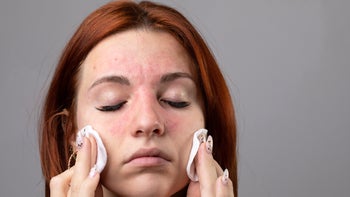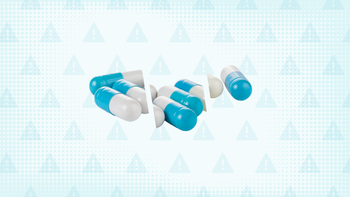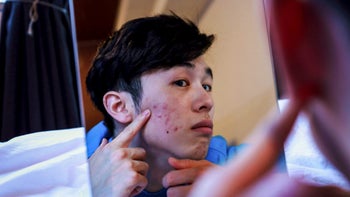
How Do I Prevent Acne? 10 Science-Backed Tips
Key takeaways:
Acne affects people of all ages, and dealing with breakouts can be frustrating.
You can make science-backed changes to your lifestyle and skincare routine that can help prevent acne.
If mask acne is your main problem, skip the makeup, wear a clean mask every day, and take regular mask breaks.

Acne can be hard to deal with, no matter what age it hits. Whether you have the occasional pimple, hormonal acne breakouts, or “maskne,” you may be wondering how to prevent acne in the first place.
Some causes of acne you can’t easily change — like your hormones and your genetics. But you can take steps to improve your diet, stress level, sleep, and skincare routine so that breakouts are less likely.
What causes acne?
The main cause of acne is clogged pores, which happen for two main reasons:
Too much oil production (called sebum)
Dead skin cells that aren’t being removed
Search and compare options
Once pores are clogged, bacteria can get trapped inside and multiply. This causes inflammation, redness, and swelling, which result in pimples. Different factors — like puberty and how you care for your skin — can increase your risk of getting acne.
How you can prevent acne
If you are acne-prone, here are 10 changes you can make to your everyday life and skincare routine to prevent acne breakouts.
1. Clean your skin every day
The first step in acne prevention is to wash your face regularly. Doing this twice a day and after sweating helps wash away oil, dead skin cells, and other contaminants.
Use your fingertips and a gentle cleanser to wash your face. Avoid washcloths, scrubs, and other materials that can irritate your skin.
2. Eat a healthy ‘acne prevention’ diet
Certain foods you eat can contribute to acne breakouts, like those high in sugars and processed carbohydrates. These high-glycemic foods raise your insulin levels and cause inflammation — both of which contribute to acne.
Try to limit high-glycemic foods, such as:
White bread, rice, and spaghetti
French fries
Soda
Donuts
Instead, opt for a diet rich in whole foods, like vegetables and whole grains, and limit how many ultra-processed foods you eat.
3. Swap saturated fats for omega-3s
Saturated fats promote inflammation, while omega-3 fatty acids reduce inflammation. Some studies show that getting regular omega-3 fatty acids can help improve acne in some people.
Limit how many saturated fats you eat by cutting back on animal products, like red meat and full-fat dairy products. And increase your intake of omega-3 fatty acids by eating more fish, nuts, and seeds.
Omega-3 fatty acids don’t just keep your skin healthy and help improve acne, by the way. They’ve also been linked to benefits for your heart, eyes, and brain.
4. Try substituting dairy products with non-dairy alternatives
For some people, drinking cow’s milk can cause acne flares. A few studies have shown that people who drink more milk are more likely to have acne breakouts. But this isn’t true for everyone — and it’s not clear why.
It’s also not clear why yogurt and cheese don’t seem to have the same link with acne. It’s possible that hormones in milk cause inflammation, which contribute to acne.
If you are breakout prone, try going dairy-free for 2 weeks to see if it helps your acne.
5. Manage your stress levels
You’ve probably noticed that your acne often gets worse during times of stress.
Keeping your stress levels low can help prevent acne breakouts. That’s because stress causes an increase in oil production in the skin, one of the causes of acne.
If you are dealing with stress and acne, there are simple but effective steps you can take to help your body feel more relaxed:
Get plenty of sleep.
Practice meditation or mindful walking.
Prioritize and plan out your daily goals.
Identify and avoid stressors in your life when possible.
Exercise regularly.
Grow your friendships and relationships.
Seek professional help if your stress feels overwhelming.
6. Use a moisturizer
Dry skin means irritated skin. When this happens to acne-prone skin, it can increase your risk of breakouts.
If you have dry skin, use a moisturizer that won’t clog pores twice a day right after washing your face. Avoid any products that may dry out your skin, like astringents or alcohol.
7. Don’t touch your face
Another tip to prevent acne is to keep your hands off your face as much as possible. When you touch your face, it can spread oil, dirt, and other contaminants from your fingers to your face. If you have acne-prone skin, this will just make things worse.
And don’t pick at your skin. That’s true for popping pimples, too.
8. Try over-the-counter acne products
If your skin tends to break out, using acne-fighting washes can help prevent pimples from forming. Look for washes with ingredients like benzoyl peroxide or salicylic acid, which can help treat and prevent acne. Find one that works for you, and use it once or twice a day.
9. Limit makeup
It’s OK to wear makeup if you have acne-prone skin. But pick the right products and use them sparingly. You should also clean your makeup brushes regularly, and keep others from using them.
Look for products that won’t clog pores and include one of these terms on the label:
Non-comedogenic
Oil-free
Won’t clog pores
When you do wear makeup, make sure you wash it off with a gentle cleanser before you go to bed.
10. Exercise daily
Regular exercise is good for your skin and your health. Physical exercise helps even out your blood sugar (glucose) levels, which keeps your insulin levels from spiking. This can help prevent acne breakouts. Exercise also helps reduce stress and can lead to better sleep.
If you sweat during exercise, wash it off as soon as you can. This will prevent sweat from triggering any acne.
How can you prevent acne from masks?
Masks are an important part of stopping infections like COVID-19. But wearing them can be hard on your skin and even cause acne or “maskne.”
So, how can you prevent mask acne? Here are a few tips to help you wear your mask without irritating your skin or breaking out:
Wash and moisturize your face regularly.
Skip makeup while wearing a mask.
Wear masks that are snug, but comfortable.
Use masks with a soft, natural, and breathable fabric on the inside layer (like cotton).
Take mask breaks if possible — 15 minutes off for every 4 hours you wear them.
Wash cloth masks after each use.
What about preventing hormonal acne?
For many adults, breakouts happen because of changing hormone levels (like for women around their periods). This can lead to more oil production and acne.
Following the steps above can help keep these types of breakouts away. If you’re still getting acne after making these changes, you could try regulating your hormone swings by starting an oral medication, like an oral contraceptive pill or spironolactone. Talk to your provider or a dermatologist to see which medication would be best for you.
The bottom line
Acne is a common skin condition that affects people of all ages. Dealing with acne breakouts can be hard no matter who you are. And the advice for acne skin care may sometimes seem overwhelming.
But fear not: You can make science-backed changes to improve acne breakouts. It may seem obvious, but a healthy diet, regular exercise, sleep, and a simple skincare routine are a great foundation for clearer-looking skin.
Why trust our experts?


References
American Academy of Dermatology Association. (n.d.). 10 skin care habits that can worsen acne.
American Academy of Dermatology Association. (n.d.). 9 ways to prevent face mask skin problems.
American Academy of Dermatology Association. (n.d.). Can the right diet get rid of acne?.
American Academy of Dermatology Association. (n.d.). I have acne! Is it okay to wear makeup?.
Khayef, G., et al. (2012). Effects of fish oil supplementation on inflammatory acne. Lipids in Health and Disease.
University of Wisconsin Health. (2016). Exercise and acne - How to balance the breakouts.
Zouboulis, C. C., et al. (2004). Neuroendocrine regulation of sebocytes -- A pathogenetic link between stress and acne. Experimental Dermatology.

























